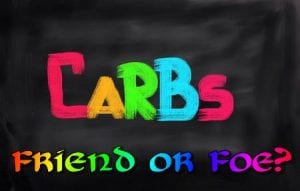 This article discusses the real truth about carbs and weight loss. It also looks at the benefits of carbs, which ones to include in your diet, how to determine how many grams of carb-rich food to eat daily, and more.
This article discusses the real truth about carbs and weight loss. It also looks at the benefits of carbs, which ones to include in your diet, how to determine how many grams of carb-rich food to eat daily, and more.
Carbohydrates often get a bad rap, but the right ones are an essential part of a nutritious diet.
In fact, medical experts and nutritionists say that we can lose weight and do so more healthily by including “good” low-GI carbs with every meal, providing they are an appropriate portion size.
The consensus is that you will lose weight without feeling hungry while giving your body the nutrients it needs if you eat this way.
Table of Contents
What are Carbohydrates?
Formed by plants, carbohydrates are carbon, hydrogen, and oxygen compounds. While often thought of as a food group, they are actually one of three macronutrients, the other two being fats and proteins.
Carbohydrates come in three types; sugar, starch, and fiber.
Foods containing carbohydrates break down into glucose that absorbs into the bloodstream, where it is used as an energy source for the brain, cells, and muscles. Our bodies store this as glycogen.
When we haven’t eaten for a while or when we’re exercising, our liver converts glycogen into glucose, sending it to the brain and muscles.
Why we need Carbs
Carbs are a principal fuel source for the brain, central nervous system, and kidneys. If you choose your carbs wisely, you will maintain your energy level and avoid weight gain and sugar level fluctuations.
Good quality carbohydrate-rich foods contain specific vitamins and minerals not found in fats or animal protein, including vitamin C and fiber.
When it comes to carbs and weight loss, some carbs promote the latter, while others don’t. Keep reading to find out how they differ.
Good Carbs, Bad Carbs, and the Glycemic Index
There are “good” carbs and “bad” carbs. Good carbs and weight loss go hand-in-hand, while bad carbs can make losing weight difficult.
Foods with a low number on the glycemic index (GI) are considered good for weight loss. These should be your  primary carbohydrate source.
primary carbohydrate source.
High GI carbs are considered bad. They should be limited when dieting. However, when it comes to nutrition, not all low GI foods are healthy, and not all high GI foods are unhealthy.
There are also medium GI foods. Eat these in moderation.
For health purposes and to lose weight without depleting your energy levels, make “good” carb-rich foods a part of your diet daily. Limit your intake of “bad” carbs, which contain calories, but little in the way of nutrition.
The glycemic index is a method for ranking the impact of carbohydrate-containing foods on blood glucose. When developed over two decades ago, it revolutionized our knowledge of how carbs are stored, broken down, and utilized.
Foods analyzed are assigned a number between 1 and 100 in relation to pure glucose, which is ranked at 100. The number allocated indicates how rapidly a particular food increases glucose levels in the bloodstream.
Low GI foods fall into the 0 to 55 category. Medium GI foods are in the 56 to 69 category, and high GI foods the 70 to 100 group.
When eating high GI foods, our blood glucose levels rise quickly. A lot of insulin is released into the bloodstream to process the glucose. Insulin promotes fat storage.
Low GI foods provide a gradual energy release, so we feel satisfied for longer after eating these. Less insulin is released when eating low GI foods. Medium GI foods fall in the middle.
The new take on carbs and weight loss
What are Some Low, Medium and High GI Foods?
Healthy low GI foods include peanuts, quinoa, barley, cut oats, fruits other than watermelon (grapes and bananas are medium GI foods), kidney beans, chickpeas, low-fat milk, and low-fat yogurt.
Some medium GI foods include plain bagels, white Basmati, and spaghetti.
High GI foods include white bread, white pasta, white rice, sugar, cookies, brownies, cakes, and candy. Other sources include some breakfast cereals, oats, starchy vegetables such as corn, pumpkin, and white potatoes, and sweetened beverages.
How Much Carbohydrate do we Need Daily?
How much carbohydrate we need each day depends on our age, weight, and the amount of exercise we do.
The Institute of Medicine recommends children and adults get 45 to 65% of their calories from carb-rich foods.
You will lose weight by staying at the lower end of the range and eating more high-protein foods. So aim for no more than 50% of your daily calories to come from carbs.
Very athletic people may need to include a higher percentage of carb-rich foods in their diet.
Carbs provide 4 grams of energy per gram. To determine how many carbs you should have each day, first, calculate your daily calorie requirement to maintain your current weight. To do this, multiply your weight in pounds by 13 if you are sedentary, by 16 if you are reasonably active, and by 18 if you are a regular exerciser.
Women generally need between 1,600 and 2,400 calories a day to maintain their weight, while men need around 2,000 to 3,000 calories.
To lose weight, the National Heart, Lung, and Blood Institute recommends women take in around 1,000 to 1,200 calories a day and men 1,200 to 1,600 calories.
Active men and women who weigh 164 pounds or more may need up to 1,600 calories a day to lose weight without feeling hungry.
To determine how many grams of carbohydrate to eat, divide your total daily calorie intake by 4.
If you want to lose weight and you will be dropping your daily calorie intake to 1,200, with 50% of your calories coming from carbs, you should consume 150 grams of carbohydrate-rich foods every day.
Won’t I Lose Weight Faster on a High Protein Low Carb Diet?
There’s no denying that we can quickly burn body fat by following a high protein diet and strictly limiting our carb intake.
An example is the South Beach Diet. It has a lot of positive feedback, and it works very well; however, it can be difficult to sustain long-term.
Additionally, high protein, low carb diets are associated with numerous health problems.
Low carb diets can lead to nutritional deficiencies, constipation, and diverticulitis.
High-fat diets are usually high in saturated fat.
Foods with a high level of saturated fat increase cholesterol levels. A high cholesterol level often leads to serious health problems, including heart disease.
If you plan on undertaking a high protein/low carb diet, consider it as a kick-start to weight loss rather than a way of life, and don’t follow it for any longer than a few months at the most.
The key to losing weight and keeping it off permanently while eating carbs is to choose minimally processed low GI foods in moderate portion sizes. Eat this way, and you will get good results without feeling hungry or jeopardizing your health.

